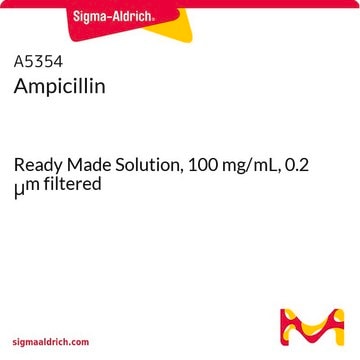H5527
Hygromycin B solution from Streptomyces hygroscopicus
≥60% (HPLC), 45-60 mg/mL in H2O, γ-irradiated
Synonym(s):
Hygromycin b, Hygrovetine
About This Item
Recommended Products
biological source
Streptomyces hygroscopicus
Quality Level
sterility
γ-irradiated
concentration
≥60% (HPLC)
45-60 mg/mL in H2O
color
yellow-brown to orange
antibiotic activity spectrum
viruses
Mode of action
protein synthesis | interferes
storage temp.
2-8°C
SMILES string
CN[C@H]1C[C@@H](N)[C@H](O)[C@@H](O[C@@H]2O[C@H](CO)[C@H](O)[C@@H]3OC4(O[C@H]([C@H](N)CO)[C@H](O)[C@H](O)[C@H]4O)O[C@H]23)[C@@H]1O
InChI
1S/C20H37N3O13/c1-23-7-2-5(21)9(26)15(10(7)27)33-19-17-16(11(28)8(4-25)32-19)35-20(36-17)18(31)13(30)12(29)14(34-20)6(22)3-24/h5-19,23-31H,2-4,21-22H2,1H3/t5-,6-,7+,8-,9+,10-,11+,12-,13+,14-,15-,16+,17+,18-,19+,20+/m1/s1
InChI key
GRRNUXAQVGOGFE-XKIAHZFYSA-N
Looking for similar products? Visit Product Comparison Guide
General description
Application
Biochem/physiol Actions
Antimicrobial Spectrum: Hygromycin B acts against bacteria, fungi and higher eukaryotic cells.
Caution
Preparation Note
Signal Word
Danger
Hazard Statements
Precautionary Statements
Hazard Classifications
Acute Tox. 2 Inhalation - Acute Tox. 3 Dermal - Acute Tox. 3 Oral - Eye Dam. 1 - Resp. Sens. 1
Storage Class Code
6.1A - Combustible acute toxic Cat. 1 and 2 / very toxic hazardous materials
WGK
WGK 3
Flash Point(F)
Not applicable
Flash Point(C)
Not applicable
Personal Protective Equipment
Certificates of Analysis (COA)
Search for Certificates of Analysis (COA) by entering the products Lot/Batch Number. Lot and Batch Numbers can be found on a product’s label following the words ‘Lot’ or ‘Batch’.
Already Own This Product?
Find documentation for the products that you have recently purchased in the Document Library.
Customers Also Viewed
Our team of scientists has experience in all areas of research including Life Science, Material Science, Chemical Synthesis, Chromatography, Analytical and many others.
Contact Technical Service








